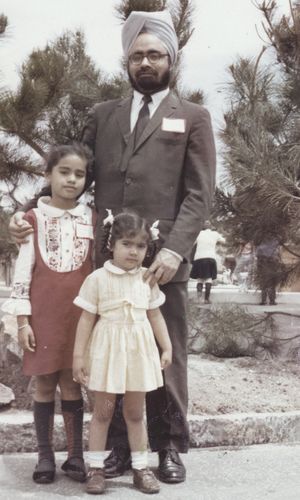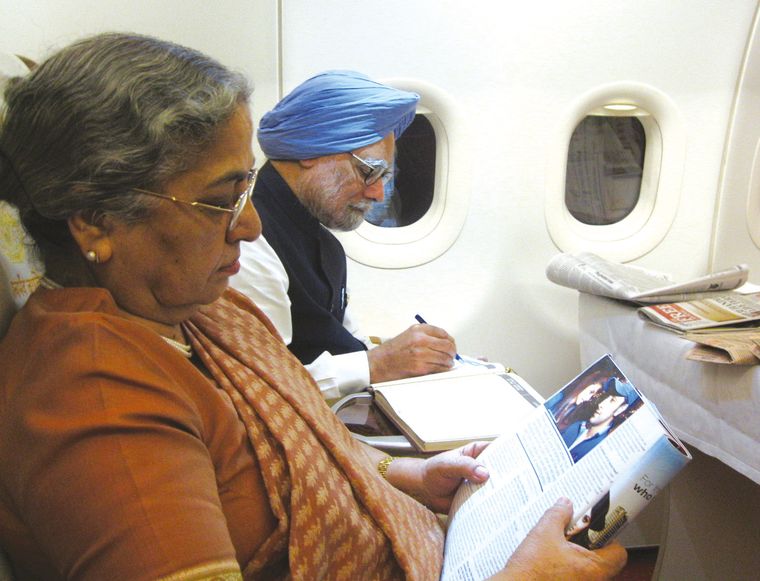When we arrived in Model Town, Kiki was ten, I was six and Amu was about six months old. We were children of the ’70s. Diligent and dutiful, we needed no prodding to study. The streets were our playground, a space we shared with passing cows and cars. Being incurable bookworms, we were hardly ever bored. We were addicted to popular music and saw every major Hindi film that was released.
Once my father joined the central government, we moved from old Delhi to new, and from a small flat on the first floor to a large bungalow with an even larger garden. After a few years in Teen Murti Lane, we shifted to our own house in Ashok Vihar, following a new rule that officials owning a residence in the city had to pay an impossibly high rent for government accommodation. Two years later we were back in Lutyens’s Delhi, this time in Safdarjung Lane. Over the years my parents would hop from house to house, sampling Tughlak Road, Bapa Nagar, Lodhi Estate, Krishna Menon Marg, Safdarjung Lane again, and Safdarjung Road before they found themselves on Race Course Road. Incidentally, this was where they would stay the longest. Each house that they lived in became a separate chapter in our collective memory.
***
Somewhere along the way he retreated from family affairs and allowed his work to take over his life. Every day his office accompanied him home in big cloth bundles that we helped lug out of the car. At an early age we learnt to tiptoe around the house when he was home. He worked in bed where he sat cross-legged with a pillow on his lap, a stack of files beside him. As he hunched over his papers, inscribing neat little squiggles, he would tug at his beard and mutter to himself. When he was not working, he was usually preoccupied with a book or else with his thoughts. He still spent time with friends, but not as much as before. Dinner invitations were normally reserved for fellow economists who were either visiting town or leaving town. The three of us helped our mother cook, serve, or simply tidy up. Our father generally omitted to introduce us to his guests and they showed no particular interest in us. Being young and fearless, Amu would often perch herself on a chair and drink in details of the economic situation in different parts of the world. But once our duties were over, Kiki and I made ourselves scarce. One such evening, Kiki dared me to slowly saunter across the living room and back, wearing a crimson gypsy scarf on my head. My father did not notice me. Neither did his visitor. My next challenge was to ask the visitor for his cigarette lighter, which I promptly did. This time they paused just long enough to observe me pocket my trophy, and returned to their conversation.

As my father travelled a great deal, I was able to build up an enviable coin collection with no effort at all. Sometimes he would return to Delhi only to fly out again the same week. There was no question of asking him to get us anything because he made it clear that he had no time to shop. We therefore had to be satisfied with a regular supply of chocolate. At times he showed great initiative by asking a female aide to pick up nightwear for his wife and three daughters. This is why all four of us were always exceedingly well dressed in our sleep.
***
The petty details of everyday life were of no interest to him. Rising way above them, he confined himself to simple words of wisdom. Thus, in times of sisterly strife we were advised to ‘Be a Gentle Ben’. Ben was a bear who starred in a television series we used to watch in New York. ‘Don’t Use Harsh Language’ was another popular theme. To remind us of the hard realities in life, there was ‘Don’t Be Soft’, and ‘What Cannot Be Cured Must Be Endured’. And since a family of five lived rather precariously on a government salary, we were frequently told that ‘Money Does Not Grow On Trees’.
A bit of a clown myself, I found my father a very funny man. When in a reflective mood, he sat with an index finger perched on the side of his nose. He was completely helpless about the house and could neither boil an egg, nor switch on the television. Due to unknown reasons, he was unable to regulate the pace of his walk. Once he took off he would charge forward at top speed, leaving his companions straggling in the distance. He also exercised at a furious pace in a flurry of flapping arms and legs. Matters of his own health were causes of intense alarm. A cold simply had to be pneumonia, and a twinge of pain anywhere above the waist was surely a heart attack. Unless they were economists, visitors filled him with panic and he desperately tried to escape them. When he failed, he would make piteous attempts at small talk. He was at his best with young children whose language skills were limited. Older children foxed him completely. He never failed to ask them what class they were in, what their favourite subject was, and what their favourite sport was. After this, he would lapse into an uneasy silence. In those days his sister Pritam came over almost every month with her family. My cousins must have been very puzzled by his insatiable interest in these three aspects of their lives.
Also Read
- Manmohan Singh's leadership style was rooted in dignity, respect and unwavering dedication to the nation
- Exclusive: 'Manmohan was my role model and a master in persuasion', says Montek Singh Ahluwalia
- How Manmohan Singh deterred an aggressive China by raising an attack corps
- 'There would have been no India-US nuclear deal without Manmohan Singh': M.K. Narayanan
- How Manmohan Singh steered a coalition government successfully
- Manmohan Singh the PM versus Manmohan Singh the FM
He also had a sense of humour of sorts. This was evident when he was with friends, even if they were economists. It was comforting to know that he could laugh and crack jokes as well. With us, he rarely did either. The lighter side of him liked to give nicknames to people. Unknown to them, one of our uncles was ‘John Babu’, another was ‘Jewel Babu’, and a third―to commemorate his pointed turban―was ‘Chunj Waley’.
Excerpted with permission from HarperCollins


